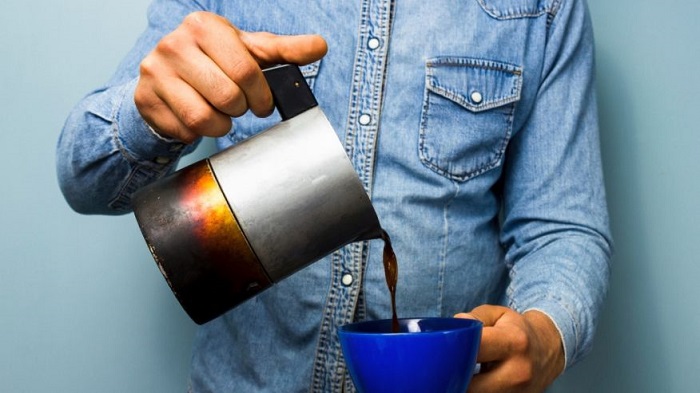6 signs you`re addicted to caffeine

“Nowadays, we don’t realize caffeine is in a lot of things we normally wouldn’t think it is,” Rachel Salas, M.D., an associate professor of neurology at Johns Hopkins Medicine who specializes in sleep medicine, tells SELF. “We think coffee or soda, but now it’s also in energy drinks, certain teas, and even different foods like waffles and gum.” We’ll add chocolate to the list. This makes it even easier to take in too much. Chances are you’re consuming more than you even realize, making your body recognize a low level of constant caffeination as the norm.
Like any other drug, the clearest evidence that you’re addicted to caffeine is that you experience withdrawal symptoms when you’re not taking it. Here are some red flags that you’ve become a little too reliant.
1. Your head starts pounding if you skip your morning mug.
Caffeine is a vasoconstrictor, meaning it makes the blood vessels slightly narrower, restricting blood flow. This makes it an effective headache reliever (that’s why it’s in some headache meds). But if you are used to a constant flow of caffeine, skipping it one day can actually cause a headache—it’s a classic symptom of withdrawal. According to theJohn Hopkins Medicine Behavioral Pharmacology Research Unit, about 50 percent of people experience withdrawal headaches if they skip caffeine for one day. Some people never experience headaches when they don’t have caffeine, even if they’re used to drinking it daily, but science doesn’t really have an answer for the discrepancy.
2. You’re super grumpy before your first dose.
Caffeine is a stimulant, and it stimulates our pleasure center. “It stimulates the dopamine receptors in our brain, kind of like cocaine and other certain drugs, just not nearly to the same extent,” Dana Hunnes, Ph.D., M.P.H., R.D., senior dietician at UCLA Medical Center and adjunct assistant professor at the Fielding School of Public Health, tells SELF. “It also stimulates adrenaline release.” This is addictive in its own right, because it simply makes you feel good. If you’re in a bad mood when you go without, it’s a sign your brain is relying on the drug to feel good.
3. You can’t concentrate without being caffeinated.
Caffeine gives your body a boost of adrenaline, which can help you stay alert and focused. If you’re used to that boost every single day, you may experience brain fog or trouble concentrating and completing tasks without it.
4. You need more to get the same effects you used to get.
It’s called tolerance, people. If you drink a lot of caffeine every day, you’ll develop it, and your body will then need more caffeine it to produce the same effects. If one cup of coffee stops making any difference on your energy levels, or you can drink a cup right before bed and have no problems zonking out, it’s a sign your body has become immune to its effects thanks to all the unbridled exposure.
5. You’re always a little on edge.
High doses of caffeine can lead to the jitters—for some people, it takes less to cause that jumpy feeling than others. Loading up on caffeine can also lead to anxiety and increase panic attacks in some people, especially those who are prone to mental health issues. If you’re more anxious than usual, take stock of your caffeine intake and try cutting back for a while to see if you feel better.
6. You just can’t bear to say goodbye.
Quitting anything cold turkey is tough. If you can’t just wake up and say “I’m skipping coffee today!” or if the thought kind of just freaks you out, you’re addicted—at least mentally. Try cutting back a bit instead of just giving it up completely. If you do it slowly, you can eventually wean yourself off the liquid lifeline. But coffee’s got some health perks, so keeping it in your life isn’t a bad idea. Just keep it to a reasonable amount—Hunnes suggests no more than two to three 8-ounce cups daily. “If it’s used correctly and in moderation, that’s the key,” Salas adds. “Just be aware of your own body and know that any stimulant or medication can affect us all differently.”















































